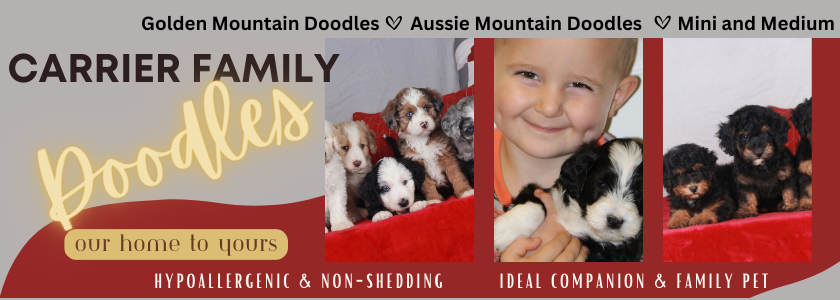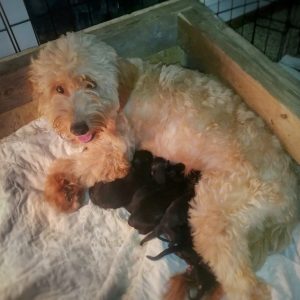Home-raised puppies have ongoing Interaction with Mama for the first 8 weeks, allowing them to be better-adjusted.
My sister sent me a link to an article recently published by the American Kennel Club, “Does Cuddling Lead to Better Behaved Dogs?” Of course, I found it interesting, and not surprisingly, it provided evidence to support why we do what we do at Carrier Family Doodles.
We have always believed that socializing puppies early and often with people and other adult dogs besides their Mama is beneficial. We have also tried to introduce puppies to household noises, different rooms in the house, new people when they come, and so on.
We even work on training our puppies to an astroturf potty area so that they will preferentially look for grass as an elimination surface when they are ready for their forever homes and the great big world out there. In our opinion, because Golden Mountain Doodles are such a sociable breed and love people, “home-raised” is simply the best option.
The article in the AKC publication offers just one more reason why home-raising should be the ideal: ongoing interaction and nurture from their Mama is key to raising well-adjusted puppies. Evidence suggests that “More maternal care and touching led to dogs with higher levels of social engagement, physical engagement, and fortitude. They were more friendly, more active, willing to interact with their world, and less likely to get spooked by unexpected and potentially threatening events in their environment.”
In our home, our puppies and Mamas have their very own whelping spot where they are as undisturbed as possible for the first 2-3 weeks (except for regular visits from a human primary caregiver). Bekah makes sure Mama is in the whelping box often and is providing regular physical contact for the puppies. No matter how well-socialized our puppies are with people, Mama needs to be a constant.
For the first few days, Mama rarely leaves the whelping box. For the next few weeks, she spends a regular amount of time cuddling, feeding, licking, nudging, nosing, and caring for her puppies. We keep an eye on things to make sure she’s spending enough time with her babies.
By the time the puppies are 5 or 6 weeks old, Mama spends more and more time out and about. The puppies begin to wean to solid food. By seven weeks, Mama may even begin growling at the pups when they want to nurse.
For the most part, we trust the Mama instincts, but we do everything we can to make sure Mama does her best for her puppies.
While each of our puppies has his or her own distinct personality, we believe that what we do in home-raising makes a big difference. Making sure our puppies have an attentive and nurturing Mama for the first eight weeks is crucial, and this AKC article confirms it.
That, along with careful and ongoing socialization with people and other animals, early introduction to the home environment, and even early potty training, gives every Carrier Family Doodles puppy their very best possible start in life.
Puppies raised in a kennel environment (particularly those known as “puppy mills”) may be taken from their Mamas too soon. “Neglectful” Mamas may not be identified and helped to nurture their babies with greater consistency. The home environment lends itself to better maternal nurture and to the development of a more secure, less anxious puppy.
Find out more about what makes our puppies special. Many of the reasons why we’ve chosen the “home-raised” model are reasons why we’ve gotten consistent, 5-star reviews from Carrier Family Doodles customers. If you’re looking for a happy, healthy, home-raised puppy, feel to see what we currently have available.
If you haven’t ever heard of the Golden Mountain Doodle, you can read about the breed on our Web site or at GoldenMountainDoodles.info.


